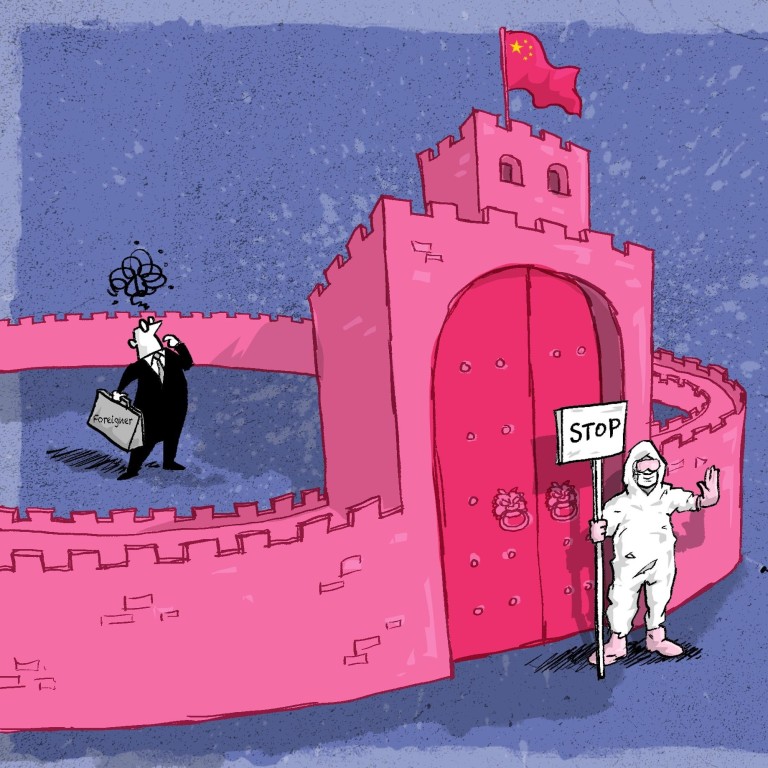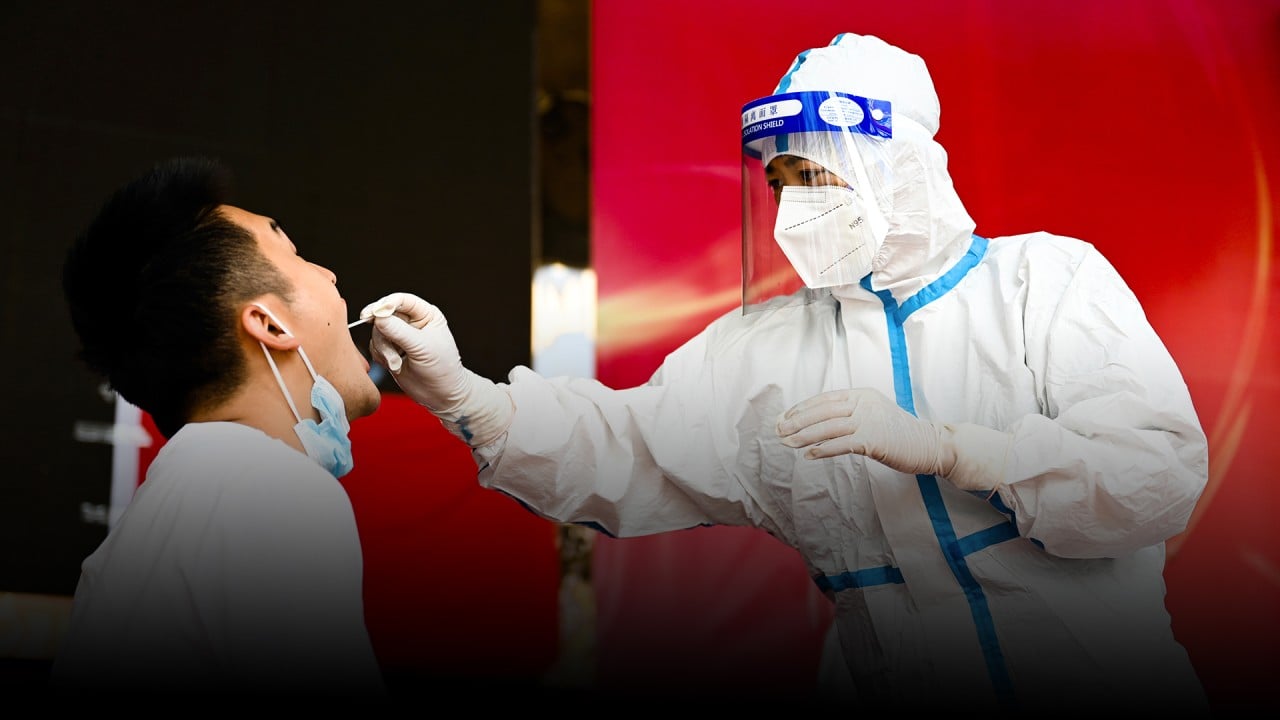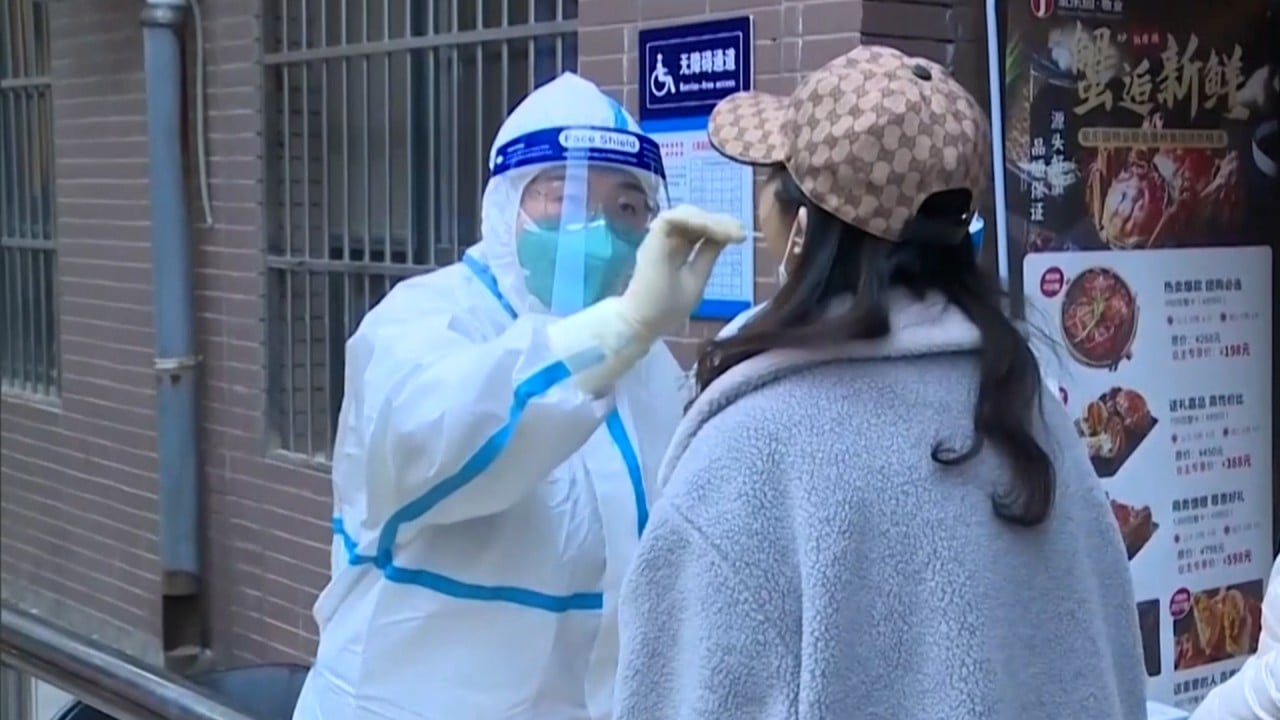
China’s Covid-19 isolation takes toll on foreign bodies – with risks for its own tech health
- Prioritising public health has helped contain outbreaks, but strict border controls make life difficult for foreign companies and staff
- Reputational damage and talent drain could harm China’s technology and innovation ambitions
This is the third and final part of a series on challenges China faces in its battle against Covid-19. Here, Zhuang Pinghui looks at the impact of its strict pandemic controls on foreign businesses and employees, and by extension its own economy.
After three years in Beijing, David Saey, a marketing manager, this week flew home to Belgium and said he would “avoid China” for at least five years.
“It’s very intense – I can’t stand being indoors for 48 hours, let alone for three weeks in a small hotel room,” Saey said.

06:05
As more countries ditch ‘zero-Covid’ policy, why is China opting to ‘wait and see’?
Many of his friends have left Beijing during the pandemic and decided against returning, for various reasons. “The feelings for the city are not the same as before Covid-19,” he said.
All along, China has followed a strategy of strict measures to eliminate the coronavirus entirely within its borders, with one key aspect being prevention of outbreaks linked to returning overseas travellers.
Chinese embassies around the world have advised against travel to China unless absolutely necessary. Entry by foreigners has been restricted, availability of international flights dramatically cut and strict quarantine requirements maintained, while arrivals are subject to numerous coronavirus and antibody tests – all to reduce the risks of imported cases leading to local outbreaks.
What next for zero-Covid China, as herd immunity faces Delta hurdle?
But it risks forcing out foreign China experts, damaging the country’s image abroad while depriving companies and educational institutions in China of valuable expertise, holding back innovation.
China’s approach has helped minimise infections coming into the country and given it breathing room to deal with sporadic local outbreaks. But while most residents’ lives have returned to relative normalcy, members of the foreign community, and even some locals, have expressed frustration that the hurdles put in place to enter the country have forced them to choose being with their family over a career in China.
Such hurdles risk adding to perceptions of a China isolated from the world, said Chong Ja Ian, associate professor at the National University of Singapore’s political science department.
“The difficulty of person-to-person meetings, including for family reunions, reinforces a view that China wishes to hold the world at a distance,” he said. “This conflicts with claims about China’s openness.
“The effects of that will be felt more as the rest of the world opens up even more for international travel.”
Business sectors have long been appealing for a loosening of controls, with China facing a talent drain that they say has impaired their operations.
A survey by the American Chamber of Commerce in Shanghai found that 70 per cent of companies experienced difficulty in attracting foreign talent and half said it was mainly caused by Covid-19 travel restrictions.
Ker Gibbs, president of AmCham Shanghai, said a burdensome and uncertain visa and re-entry process, high costs and limited flight availability had all contributed.
The growing problem of Covid-19’s ‘long-haulers’ a global challenge
Short-term visitors faced these difficulties too, and a long quarantine, but travel restrictions hurt resident foreigners and business operations the most.
“Our member companies are having a hard time keeping these people, largely because their dependents can’t travel in and out of China,” Gibbs said. “If you can’t fill those positions, it has a big impact on your business.
“It’s a question of finding the balance. Of course we want strong virus controls, but we also want more freedom in operating businesses.”
According to the latest annual position paper by the European Union Chamber of Commerce in China, very few business visitors have been able to get business visas, and many who did were deterred by quarantine of up to four weeks in some areas.
China rejects ‘living with Covid-19’ model even as spikes get ‘more common’
“As truly impressive as China’s tight control of Covid-19 has been, the administrative hurdles and restrictions on access to the country really do hurt foreign and Chinese businesses,” said Adam Dunnett, of the EU chamber.
“Aside from a minority of executives and other special cases who are willing to endure three weeks of quarantine each time, most people are slowly giving up in frustration. Many international schools are also waiting for teachers to return, and many families are waiting to be reunited.”
These hurdles delay projects and jeopardise investments into China, with headquarters reluctant to commit without personnel being able to visit.
Many expatriate employees, who normally serve as a bridge between a company’s China operations and its headquarters, are deciding whether to leave China because of the impact of travel restrictions on their family life.
William Zarit, a senior counsellor with the Cohen Group in Beijing and a former AmCham China chairman, echoed the concerns.
“[The restrictions] make it more difficult for foreign businesses,” Zarit said. “There are just some things for some businesses that need people who know the home office well, that know the operation in the US or Europe and can be the interpreter.”
Zarit himself was outside China when the pandemic began and could not return to work until this week, after 23 months away because of travel restrictions and procedural delays.
“There are so many hoops to jump through,” he said, citing the testing, verifications and documentation needed before flying into China, on top of gaining visa approval.
“This is one of the most significant and under-reported consequences of border restrictions,” he said. “We see technical experts in critical industries – chemicals, information and communications technology, banking, automotive – foregoing travel. And we see the postponement of important executive postings that play a critical role in research and development, and investment decisions.
“If this trend continues, it will certainly have an impact on China’s ambitions in tech and innovation, and its business environment more broadly.”

01:51
China steps up zero-tolerance approach to Covid-19 as Delta fears grow ahead of Beijing Olympics
Families, too, have been forced to make or delay difficult decisions.
Grace Cheng, a 31-year-old Beijing resident, had to reunite with her American fiancé in Turkey after he left China in February 2020 then could not return the following month because China closed its borders – meaning his employment was terminated. They married in Turkey but were stranded in Taiwan because, even as her spouse, her husband could not enter mainland China.
Restrictions were partially relaxed in September last year to let in those who had valid visas before the border closed. Those applying for new ones needed invitation letters from certain state-owned enterprises or provincial-level government authorities, asserting that they represented high-level foreign talent.
“I hope there is a better policy or the policy can become more humane, allowing families to reunite,” Cheng said. “I had to get married overseas and haven’t been able to see my family in Beijing since. I have no idea when China will open up and all we can do is to wait, with no hope in sight.”
Recruitment difficulties will continue, with no sign of China relaxing its rules, Zarit predicted.
Neither health authorities nor senior officials have given any hint of an exit plan, reiterating only that people should get vaccinated – which almost 80 per cent of China’s population now has.
The travel restrictions and quarantine requirements look likely to last at least another year, given their effectiveness in containing outbreaks and popular support, according to a report by Gavekal Dragonomics. Success in halting outbreaks of the more transmissible Delta variant has only increased policymakers’ confidence in the approach, it said.
China’s zero Covid approach sparks debate about long-term economic impact
Restrictions have prevented the travel and retail sectors recovering their pre-pandemic growth levels, and an outbreak that spread from Nanjing to 19 provinces caused an outright decline that month for travel and catering. But abandoning the strict policies would not necessarily revive them, said analyst Cui Ernan, the report’s author.
“Given that most Chinese take a very risk-averse approach to Covid-19, and there is widespread concern about its long-term health consequences, the spread of the virus would still have an impact on consumer behaviour and confidence,” Cui said.
Zarit, from the Cohen Group, said pandemic controls dovetailed with what could be seen as broader trade-offs that China makes between being open for business and ensuring security.
“Keeping the pandemic under control is so critical for China,” he said. “It makes things more inconvenient for the likes of me, but it’s hard to say that it’s not in China’s interests to continue with zero tolerance – it may just be the thing that keeps the economy going, keeps the country going and keeps the pandemic at bay.”
Border controls and zero tolerance have proved popular, and no change is expected with the Winter Olympics in Beijing approaching in early February, followed by next autumn’s twice-a-decade national congress of the Communist Party.
“The Chinese government has developed its own epidemic prevention model that is unique to its national conditions, and this has been presented as a competition of political systems with Western countries, so China will not easily give it up,” said Chen Daoyin, a political analyst.
Success in containing outbreaks has made all levels of government dependent on the measures used, so changing strategy could undermine epidemic prevention efforts, Chen said.
Chong, of the National University of Singapore, said loosening controls was less about the Olympics than about public health, measured by the resulting infection and hospital admission rates.
“Such timing would not seem consistent with the party’s emphasis on public health,” Chong said. “What would be consistent is to loosen up when an even higher proportion of the population has been vaccinated or a significant proportion received booster shots.”
Additional reporting by Simone McCarthy and Laura Zhou




